Dental Implant Treatment
What is a Dental Implants?
Dental implants can be defined as artificial teeth roots that are placed into the bone mass on a single arch to replace missing teeth. The implant perfectly applies the function of a natural tooth root when placed to replace a missing tooth. This not only restores the function of the lost tooth but also provides an cosmetically enhanced smile.
Titanium is the component used for implants due to its capability of being highly sustainable and durable along with being extremely biocompatible. The human body and bone mass tolerates titanium successfully and eventually, the bone tissue merges with the titanium implant, enabling it to bond with the jawbone.
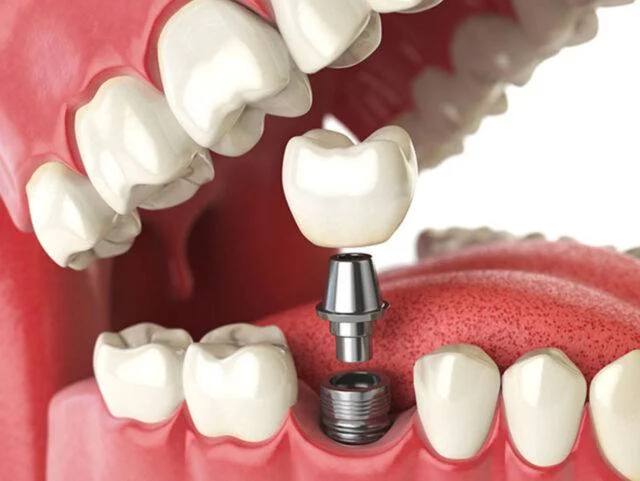
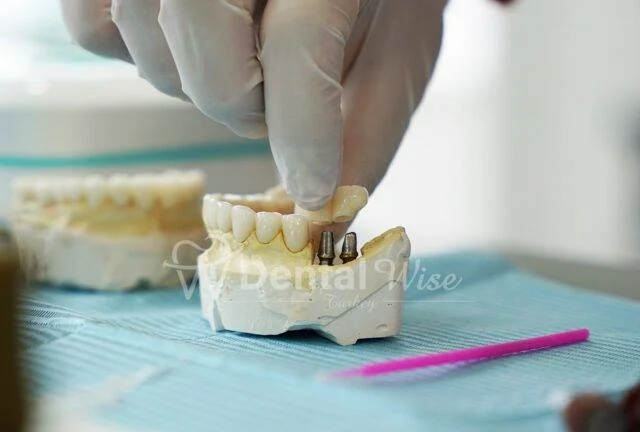
Who is Dental Implants suitable for?
Implant treatment is commonly recommended for individuals who are at least 18 years old, have fully developed bones, and are in good physical condition. However, the presence of ample jawbone is essential for the success of implant procedures. The suitability of your jawbone should be carefully considered when contemplating implants and their potential impact on your oral health.
Patients who are thinking about getting dental implants should disclose to their dentists about their general health. When assessing a patient’s suitability for dental implant treatment, information about chronic conditions, medications they regularly take, and other medical history details are crucial. Providing this information helps the dentist create a more effective treatment plan.
Lastly dental implant candidates should maintain open and consistent communication with their dentists so that the latter can assess both their overall health and the structure of their jaw. This facilitates the establishment of the perfect setting for a fruitful implant procedure.
How is Dental Implants done?
When treating dental implants, there are typically several surgical steps involved. Any teeth that require extractions are removed in the first step. An implant is placed to replace a tooth that has been extracted the implant is typically located in the jawbone. the implant placement process involves the surgeon carefully inserting an implant, which usually looks like a titanium screw, into the jawbone to ensure a secure fit and integration with the bone. The implant is then able to fuse with the jawbone during a few month long healing phase.
When the healing process is complete, the second phase begins. An abutment is placed on the implant to act as a connection. The abutment facilitates the connection of a dental crown or prosthetic tooth. The final procedure is to affix the new tooth or crown to the implant. The necessary actions that must be performed in order to carry out successful and durable dental implant operations are outlined in these thorough instructions.
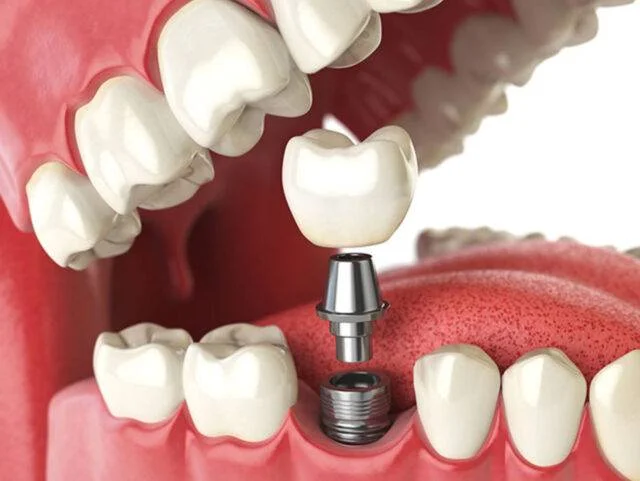
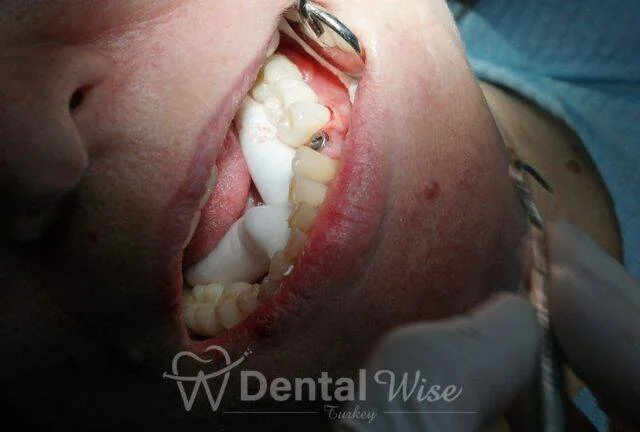
Dental Implant Treatment in One Day in Antalya/Turkey
For the long term and effective replacement of lost teeth, dental implants are an excellent option. However, there are a number of variables that can affect how long the implant procedure takes. The length of time depends on the number of implants, where they are located, and the state of the jawbone. A single implant can usually be placed at Dental Wise Turkey in 10 to 20 minutes on average.
The implant procedure can be tailored to the patient’s needs and situation. An initial assessment conducted before the procedure helps in creating an appropriate treatment plan. The placement of a single implant may be quicker, while inserting multiple implants could take more time.
Additionally, the quality and quantity of a patient’s jawbone can influence the duration. In cases of inadequate bone, bone grafting or additional procedures may be necessary, potentially extending the procedure time.
The implant procedure typically requires multiple visits. During the initial visit, the implant is placed, and the healing process begins. Once the healing is complete, a tooth can be attached to the implant.
In summary the implant process must be customized for every patient and its duration of time might vary depending on a number of factors . You should speak with a dentist to learn more about implant therapy and to get an idea of how long it will take .
What are the advantages of a teeth implant?
In addition to being a cosmetic concern, tooth loss can result in a number of health problems. Dental implants, however, provide a practical fix for these issues. First, by bonding with the jawbone, implants build a solid base. This stops bone resorption in addition to simulating the pressure on the jawbone as natural teeth would. Unlike other tooth replacement techniques, implants preserve bone density by stimulating the jawbone and acting like real tooth roots.
Dental implants stand out with additional advantages. Cosmetically, implants resemble natural teeth and function similarly, helping individuals maintain their natural smile and boost self-confidence. Furthermore, they can be placed to replace a missing tooth without harming surrounding healthy teeth, distinguishing them as a significant advantage compared to other restoration options.
In addition, dental implants restore speech and chewing functions to the closest resemblance of natural teeth. This ensures that patients can comfortably eat and maintain their natural speaking abilities.
In conclusion, dental implants prove to be one of the most advantageous and long-term solutions for tooth loss. Providing an excellent balance between health and aesthetics, implants offer patients the opportunity to regain a safe, durable, and natural smile.
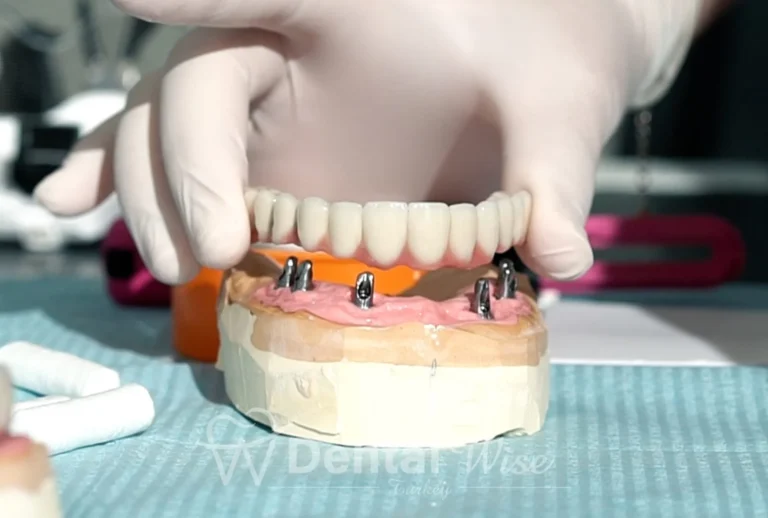
The Dental Implant Procedure
Consultation & Examination: A dentist evaluates your oral health and bone density.
Implant Placement: A titanium post is inserted into the jawbone.
Healing Period: Osseointegration (bone fusion) takes a few months.
Abutment & Crown Placement: A custom crown is attached for a natural finish.
Cost of Dental Implants
The cost varies depending on factors such as:
Number of implants required
Type of implant procedure
Additional treatments like bone grafting
Clinic location and dentist expertise
Why Dental Implants Antalya
Dental implants are the best alternatives for natural teeth today in the case of tooth deficiency. It is the prosthetic rehabilitation method which gives the best result especially when there is no need to support the teeth on the side of the bridge or if there are no teeth to be supported.
In addition, it is the most successful method that does not have alternative dental implants for totally fixed prosthesis applications or to increase the retention of total prosthesis in case of total toothlessness.
Dental Implant Success Rate in Antalya
Dental implants are a form of treatment that can provide exceptionally successful results in terms of patient and physician when applied with accurate diagnosis, sufficient knowledge, experience and equipment.
Application of Dental Implants Antalya
Dental implants are a longer-lasting treatment than fixed bridges made using removable dentures or adjacent teeth on gums. Dental implants are placed by oral and maxillofacial surgeons.
